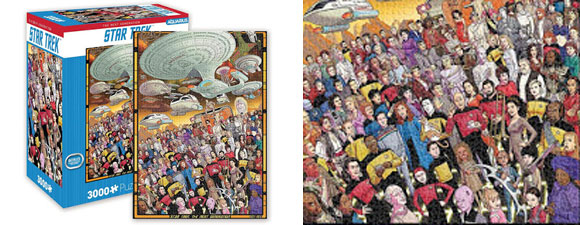Retro Review: Imaginary Friend
6 min readThe fictional companion of a little girl begins to appear in the flesh to crewmembers and to threaten the Enterprise.
Plot Summary: While the Enterprise investigates a nebula with strange energy readings, Troi meets with Clara Sutter, whose father, an engineer, is concerned because his daughter’s best friend is an imaginary girl called Isabella. Troi tells Sutter that she believes this is a normal outlet for a child who has moved from one place to another when her father has been transferred, since she keeps having to make new friends and craves someone constant. Unseen by the crew, a red energy being penetrates the ship and takes the form of Isabella, appearing to Clara and asking to be taken around the Enterprise. Worf growls to see two little girls in a restricted area, so Isabella makes herself invisible whenever others are nearby. Clara’s father is upset when his daughter comes into engineering claiming that Isabella wanted to see the engines. He and LaForge are very busy because energy strands from the nebula have slowed the ship’s progress and are preventing it from withdrawing. Troi asks Clara to play with other children and leave Isabella behind, introducing her to Alexander. This enrages the alien Isabella, who destroys a cup Alexander has been making for Worf. Isabella tells Clara that when others like her arrive, everyone on the ship will die. After Sutter asks Troi for assistance with his panicked daughter, Troi attempts to show Clara that there is nothing to be afraid of, only to have Isabella materialize and shoot an energy beam at her. Realizing that there is a link between the no-longer-imaginary friend and the energy beings outside the ship, Picard asks Clara for help making contact with Isabella, who says that she came to the Enterprise to assess whether the starship represented a threat to her people and to evaluate the purity of their energy sources. She announces that she finds the crew to be cruel and oppressive based on the way they treat Clara. Picard explains that they restrict their children to protect them, promising that the crew will try to provide energy for Isabella’s species. Clara pleads for the safety of the others, assuring Isabella that they do care for one another. Isabella disappears, and the energy strands release the ship. The Enterprise departs at full power to send energy to the beings in the nebula.
Analysis: While there are some entertaining aspects to “Imaginary Friend,” I think it wasn’t wise to produce yet another episode centering on a kid during this fifth season when we’ve already had episodes focused on Alexander, Timothy, Wesley, even newborn Molly O’Brien. I love the generational aspects of this series – the fact that there are children on the ship, the romantic and domestic ties among crewmembers, the fact that the legendary Spock is still trying to come to terms with his feelings about his father – but I can’t help feeling that it’s become too much of a good thing by now. I like the “Bad Seed” aspect of the storyline, the fact that Isabella is a genuinely creepy creature – her childlike tantrums have the threat of deadly violence behind them – but when she tries to reason that it’s all because of the mistreatment of children on the Enterprise, it doesn’t ring true.
Like most of the children we’ve seen on the series, Clara is almost absurdly well-behaved, while Alexander has become a model of good behavior in a few short weeks. Not long ago he’d have refused to make a cup for his father, or smashed it after some minor argument over chores, or at the very least taken a swing at the person he blamed for ruining it. Isabella is the only one who acts like a believable kid. Troi’s telling Sutter that his daughter needs some kind of secure companion is the understatement of the year, and it’s a wonder that Clara’s not acting out in exactly the same ways that Alexander did during his first hours on the Enterprise. The child actress playing Isabella is a bit over-the-top, which makes the character even more sinister in comparison to perfect little angel Clara, who has to remind Isabella to smile. Clara reasons like an adult; she understands that her lack of a best friend is because her father has moved from job to job (and from ship to ship), and accepts this with greater calm and assurance than many adults would accept the need to pick up and move for a family member’s career. Unlike adults, who at least feel empowered to place their own long-distance calls, Clara can’t even be sure of staying in touch with any friends she made before she moved. Plus she’s on a ship where the threat of death is considerably higher than if her dad had a domestic job on Earth. Seems to me her father is lucky that Clara only has an imaginary friend and not screaming nightmares.
It doesn’t help that yet again the sci-fi story is very soft – how many times have we seen energy beings invade the ship, impregnate Troi, take over crewmembers’ minds, etc.? The pattern wherein LaForge and Data try to figure out a mysterious scientific problem that increasingly poses a threat to the ship, yet never manages to destroy the ship, has been used too often by “Imaginary Friend” – the episode could have gotten away with being either a kids-in-space story or an alien-threat-of-the-week story, but with both aspects feeling overused, the storyline drags. There’s never any real sense of menace from the red energy strands, and it’s never clear whether they’re actually under Isabella’s control or whether she’s one being with her own agenda while the rest of them are only trying to absorb energy from the ship. I believe there’s some technobabble explanation of why the beings live near a neutron star and why their own energy sources are failing, but it didn’t make enough of an impact on me that I understood how they were going to survive once the Enterprise was gone and its power depleted.
What works best, as always, are the character interactions. After being absent during Picard’s romantic crisis with Kamala – which he seems to have forgotten, for there’s no crankiness, not even the captain’s usual discomfort having to work with children – Troi returns for a prominent role. I love her when she’s calm, matter-of-fact, efficient, yet it’s a bit strange that an empathic counselor can neither sense an alien presence in the room with her nor an unusually high level of anxiety in a little girl experiencing something far beyond normal childhood nightmares (or whatever might pass for “normal” on a starship). It’s a cliche when she turns around and sees Isabella, who stuns her; how much more dramatic would that have been if it were Data or Worf knocked out by what looks like a little girl’s tantrum? It would have been funnier, too, like the scene where Worf (in full “not a merry man” mode) bumps into the two girls on one of the engineering levels and orders them away. Most of the other attempts at humor, like Guinan’s humoring Clara by pretending she believes in Isabella, come across as condescending, even cloying. I wish Isabella had gone off by herself a bit more and caused trouble with the regular crewmembers, or even dragged Clara along with her, showing some realistic responses to peer pressure rather than those of a near-perfect child.
And what does it mean in the end when Isabella and Clara pledge to remain friends? Isabella may have the best of intentions, yet she’s one more person who’s going to disappear out of Clara’s life. It’s a bittersweet ending that chickens out from confronting the ongoing sense of loss that faces Clara, a lot like the way “Hero Worship” blithely dismisses the epic tragedy of a little boy’s becoming an orphan with the assumption that he’ll be fine once he moves on to the next adventure. When the adults can think to do nothing but send a child to bed alone while disaster threatens all around, something’s wrong with the parenting skills and priorities of those grownups. Worf seems finally to get it, so how come no one else does?






